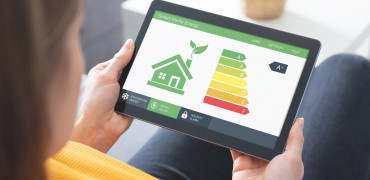This weekend, the newspapers are once again full of revelations about the refurbishment of the flat that the Prime Minister, his fiancée Carrie Symonds and their little boy occupy in Downing Street.
The speculation over whether Boris Johnson paid for the refurbishment himself is not a topic we will focus on here. Nor will we get into whether John Lewis is ‘aspirational’ for most Brits, or too ‘down market’.
But the news of golden wallpaper at £800 a roll, highlights how the government has missed a golden opportunity to match its environmental rhetoric.
Regardless of who paid what and who said what to whom, why isn’t the priority in any flat refurbishment focused on sustainability?
In fact, why doesn’t the Government use Downing Street to lead the way and show how we can modernise UK buildings?
This could be the start of the green economy and we really could ‘build back better’
Historic inefficiencies
The Government has set tough, aspirational targets on carbon reduction, with a target of net zero emissions by 2050.
Yet Britain still contains some of the most energy inefficient buildings in the world, with an estimated 19 million ‘draughty’ homes that still need better insulation and other thermal efficiency measures, to enable them to benefit properly from the move away from gas and oil, to electric heating such as air source heat pumps.
It’s long been acknowledged that we can’t just ‘build’ our way to a sustainable future and nor would we want to. The country is rightly proud of its rich heritage, with buildings that have been used for decades or even centuries, still likely to be in use for decades to come.
Many of our businesses are also operating out of historic buildings that may have had an IT upgraded to bring it into the 21st Century, but are still being heated by gas boilers.
Meeting our climate change challenges means that we simply have to find ways to tackle these millions of historic homes and businesses, but there is good news as the technology to help is already here.
The green economy
This serious drive towards a greener future needs a serious push by Government and part of this is ensuing that there are enough well-trained installers who can help us move away from carbon-intensive heating towards low carbon renewable technologies.
This will require proper training for these ‘green’ jobs and this is actually where the COVID pandemic has forced through change that is making a positive difference.
Prior to the series of lockdowns and the need for social distancing, we at Mitsubishi Electric were training an average of 50 engineers a week on how to specify, install and commission air source heat pumps.
Once it became apparent that we could no longer get these engineers to visit one of our training centres around the country, we had to find new ways of reaching them.
Cue a steep learning curve by my excellent colleagues in our training department, investment in cameras, broadcast equipment and a little bit of trial and error.
Now, we have a comprehensive, interactive training programme that can train up to 100 engineers at a time and is now averaging 800 a month.
And this is just as well because to reach our sustainable future, we need to find enough renewable heating engineers to meet the expected demand for 600,000 heat pumps a year.
Of course many of these can come from retraining gas engineers and what is needed now is finding ways to encourage others to prepare similar programmes.
This is why we are working with the Heat Pump Association and why we are also talking to The BESA about their apprenticeship scheme, so that together, the industry can help quickly develop the skilled people in the right numbers to match the huge interest in renewable heating.
Balancing carrots and sticks
And this is where the government can help. They have been quick to recognise when something is not working properly, as the scrapping of the Green Homes Grant shows.
They have also spoken about increasing support for apprentices which the industry could certainly get behind if given clear direction.
And that’s not forgetting the increasingly tough legislation that means there is no longer a future for gas and oil.
So we need government to find an ideal balance between that ‘stick’ of legislation and the ‘carrot’ of incentives, whether that is to individual homeowners or businesses, or to the industry and new heating engineers in particular.
And one way they could do this is by leading by example and bringing the historic Downing Street estate into the 21st Century - I'm sure we could find them a heat pump or two!
All in all, this could be the real start of the green economy and we really could ‘build back better’.
Let’s hope we can all move forward before someone decides it’s time to draw a curtain over such discussions!
Russell Jones is content and communications manager



